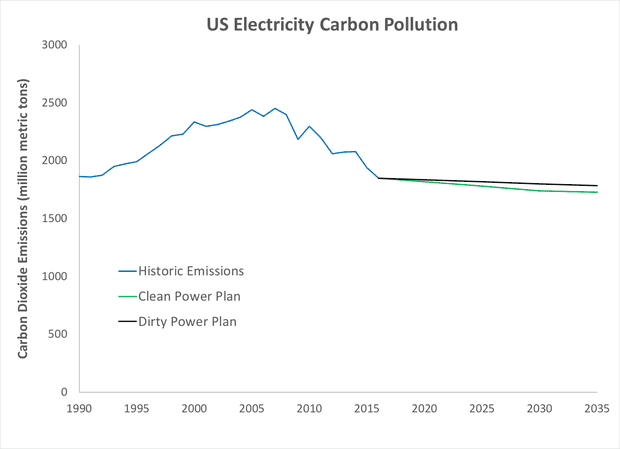One of the remarkable things about the new EPA assessment released for Trump's power plan, isn't even related to the new plan.
The EPA has radically reduced the estimated impact of Obama's Clean Power Plan. 1/
Trump’s Dirty Power Plan is much worse for kids’ health than for climate change
Posted on 27 August 2018 by dana1981
Last October, then-EPA Administrator Scott Pruitt announced that the agency would repeal the Obama administration’s Clean Power Plan. But because the Supreme Court ruled in 2007 that carbon dioxide is an air pollutant and the Obama EPA correctly concluded that it poses a threat to public welfare via climate change, the EPA is legally obligated to do something to address that threat. That meant they needed a replacement plan.
Last week, the Trump EPA unveiled that plan and inaccurately named it the ‘Affordable Clean Energy Rule.’ The rule basically just extends the life of some dirty coal power plants and encourages them to run a bit more efficiently. The rule’s costs in worsening public health far exceed its monetary benefits. It would more accurately be named the ‘Expensive Dirty Power Plan.’
But there’s a silver lining – coal plants are already shutting down so quicklybecause they can’t compete with cheaper, cleaner alternatives that it turns out we don’t even need the Clean Power Plan to meet Obama’s targets.
Dirty Power Plan’s climate impact is small
Many news stories about the Dirty Power Plan exaggerated its climate impact due to confusion about various points of comparison. For example, the Clean Power Plan aimed to reduce carbon pollution from US electricity generation 32% below 2005 levels by 2030. The Dirty Power Plan will encourage coal plants to operate more efficiently, which the EPA estimates will reduce emissions about 1% more than simply repealing the Clean Power Plan.
That sounds like a big difference between the two plans, and it confused a lot of reporters. The key point is that US electricity generation was already becoming cleaner years before the Clean Power Plan was even conceived. Coal plants have been shutting down so rapidly that power sector carbon pollution is already 25% below 2005 levels. That happened without the Clean Power Plan ever going into effect – we basically didn’t need it, because coal was replaced anyway just for being too expensive.
The EPA’s new analysis found that under the Clean Power Plan, carbon pollution from US electricity generation would have fallen 29% below 2005 levels by 2030, and under the Dirty Power Plan, it would fall 26% below 2005 levels by 2030.

Carbon pollution from US electricity production historically (blue) and as projected by the EPA under the Clean Power Plan (green) and Dirty Power Plan (black) Illustration: Dana Nuccitelli using EPA data
Both appear to be extremely conservative estimates – remember, US power sector carbon pollution already fell 25% below 2005 levels by 2016 – but the point is that the climate difference between the plans is relatively small.
Basically, the Obama Clean Power Plan tried to accelerate the transition away from coal power, but it’s already happening so fast that it couldn’t go much faster. The Trump Dirty Power Plan tried to save the coal industry, but the coal death spiral has so much momentum that they could only tap the brakes and slow it down a bit. The EPA estimates that US coal production will be just 8% higher in 2030 under the Dirty Power Plan than it would have been under the Clean Power Plan.
That’s bad for our air, our health, and it’s expensive
While that slight increase in coal production won’t have a big climate impact, it’s bad news for anyone living near a coal power plant – mainly poor people and minorities, in places like West Virginia. Specifically, the EPA analysis estimates that the Dirty Power Plan will cause:
-
900 more premature deaths per year
-
40,000 more annual cases of asthma
-
42,000 lost work days
-
60,000 more school absence days
-
230,000 more restricted-activity days for kids
The EPA analysis concludes that the costs of these adverse health effects will far exceed the minimal costs of compliance with the Clean Power Plan. Specifically, the Dirty Power Plan represents a $2.7bn to $6.1bn annual loss for the US economy. Over a 15-year period, it adds up to an approximately $50bn loss due to the adverse effects of the increased coal pollution from the Dirty Power Plan. As Joe Romm put it:
In short, Obama’s CPP is a no brainer — small cost, huge benefits. And remember, this is according to figures buried in calculations released alongside the announced plan to repeal the CPP.
Yet, Trump has asserted for years that the CPP was a costly mistake, and that’s why the U.S. had to become the only major country in the world to withdraw from the Paris climate accord.































 Arguments
Arguments






























Relevant article: Anti-Environmentalism/ Green Backlash
Sharon Beder.
"Anti-environmentalism refers to the way that corporations and conservative groups in society have sought to counter the gains made by environmentalists, to redirect and diminish public concern about the environment, to attack environmentalists, and to persuade politicians against increased environmental regulation."